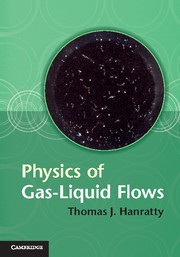Crossref Citations
This Book has been
cited by the following publications. This list is generated based on data provided by Crossref.
Thibault, Daniel
Munoz, Jean-Michel
and
Liné, Alain
2015.
Multiple holdup solutions in laminar stratified flow in inclined channels.
International Journal of Multiphase Flow,
Vol. 73,
Issue. ,
p.
275.
Parsi, Mazdak
Vieira, Ronald E.
Torres, Carlos F.
Kesana, Netaji R.
McLaury, Brenton S.
Shirazi, Siamack A.
Schleicher, Eckhard
and
Hampel, Uwe
2015.
On the effect of liquid viscosity on interfacial structures within churn flow: Experimental study using wire mesh sensor.
Chemical Engineering Science,
Vol. 130,
Issue. ,
p.
221.
Šefko, Šikalo
and
Edin, Berberović
2015.
Analysis of Droplet Deposition in a Vertical Air-water Dispersed Flow.
Procedia Engineering,
Vol. 100,
Issue. ,
p.
105.
Parsi, Mazdak
Agrawal, Madhusuden
Srinivasan, Vedanth
Vieira, Ronald E.
Torres, Carlos F.
McLaury, Brenton S.
Shirazi, Siamack A.
Schleicher, Eckhard
and
Hampel, Uwe
2016.
Assessment of a hybrid CFD model for simulation of complex vertical upward gas–liquid churn flow.
Chemical Engineering Research and Design,
Vol. 105,
Issue. ,
p.
71.
García, Juan
Vigueras-Rodriguez, Antonio
Castillo, Luis
and
Carrillo, José
2017.
Evaluation of Sulfide Control by Air-Injection in Sewer Force Mains: Field and Laboratory Study.
Sustainability,
Vol. 9,
Issue. 3,
p.
402.
Sommerfeld, M.
2017.
Particles in Flows.
p.
327.
Chhabra, Raj P.
and
Patel, S.A.
2020.
Kirk-Othmer Encyclopedia of Chemical Technology.
p.
1.
Haase, Stefan
Bauer, Tobias
and
Graf, Eric
2020.
Gas–Liquid Flow Regime Prediction in Minichannels: A Dimensionless, Universally Applicable Approach.
Industrial & Engineering Chemistry Research,
Vol. 59,
Issue. 9,
p.
3820.
Wang, Jing
Xu, Ying
Wu, Hai-Tao
Yang, Yi-Guang
Zhang, Tao
and
Wang, Xi-Gang
2021.
The Influence of Pseudo-Slug Flow on the Measurement Characteristics of Venturi.
p.
1.
Saini, Sunny
Thaker, Jignesh
and
Banerjee, Jyotirmay
2022.
Analysis of interfacial dynamics in stratified and wavy-stratified flow using Laser Doppler Velocimetry.
Experimental and Computational Multiphase Flow,
Vol. 4,
Issue. 2,
p.
142.
Pasqualette, Marcelo A.
Palacios, Mariana
van der Geest, Charlie
Passarelli, Fábio M.
Spelta, Marcelo J. M.
Lima, Guilherme S. V.
Hayashi, Lucila M.
Fonseca, Roberto
Carneiro, João N. E.
Bidart, Antônio M. F.
and
Oliveira, Felipe S.
2023.
1D numerical simulations of wax deposition in a subsea passive cooler prototype for the evaluation of minimum experimental test times.
Journal of the Brazilian Society of Mechanical Sciences and Engineering,
Vol. 45,
Issue. 9,



